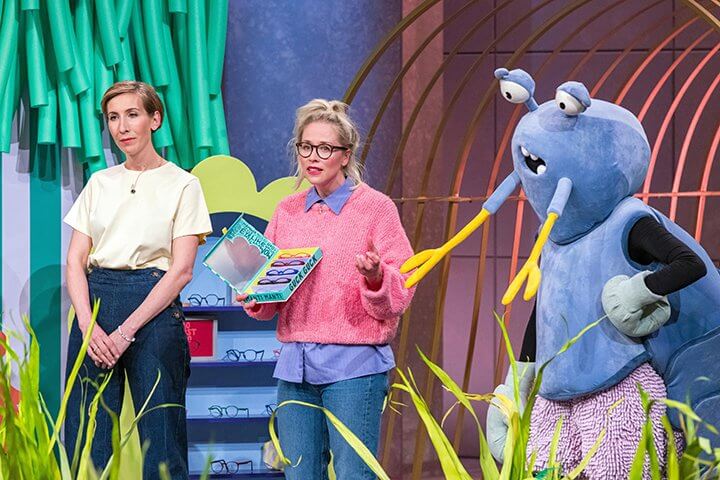Manti Manti: When investors get emotional #DHDL
Start-ups with high-priced products in particular are often confronted with seemingly unfair criticism. High-priced niches are very interesting, as they often promise good margins and thus allow for rapid growth and then perhaps expansion into other price ranges.
Friday,
20.09.2024

Pretty much every founder who has had frequent dealings with investors has certainly experienced the situation of being confronted with seemingly unfair questions and judgements from the investor side.
Of course, this can simply be a subjective assessment, but sometimes there are indications that you may have hit a sore spot with your counterpart. This suspicion also came to the fore with the startup ‘Manti Manti’ and lioness Tijen Onaran in the latest episode of ‘Die Höhle der Löwen’.
So how can you react if you have the feeling that you can no longer argue logically with someone from the investor side?
Because things actually started pretty well for the start-up that has developed sustainable children’s glasses. Their product, its lightness, the design, the customisability and the sustainable material made from castor oil were very well received and the lions present all seemed very interested.
However, Nils Glagau’s question about the sales price triggered a heated discussion. A frame is said to cost around €198, plus another €40 for the glazing.
The questioner and Löwen colleague Janna Ensthaler immediately find this very expensive, the latter comments that they are probably at the upper end of the price spectrum for children’s glasses and wants to know how this can be justified.
The founders’ arguments seem to satisfy most of the lionesses, as they argue that the range of qualities is in the premium segment and that other segments in the children’s sector, such as school bags, have shown that parents are very willing to spend a lot of money on premium products.
But Tijen Onaran, of all people, who invested in a set of cards for personal development in the last episode that the other lions thought was completely overpriced, doesn’t follow the argument at all. She finds it ‘privileged’ and thinks you should also be able to reach people from other social classes.
Judith Williams argues that this is a premium product for an affluent target group and that Manti Manti can achieve a correspondingly high price with this target group due to its USPs. She sees a clear distinction between entrepreneurial issues of this kind and the discussion as to whether products should also be offered for other social groups.
However, Tijen Onaran counters with the objection that the market would be bigger if at least one product were also offered for the other target group, but Judith Williams deliberately uses the lions themselves and their not entirely favourable clothing as an example of the fact that there are different product categories. With her restated statement ‘the social responsibility of a company and how the company is positioned – which target group, which products – are two completely different pairs of shoes’, she gets to the heart of a fact that is often difficult to convey to many people due to the emotional nature of the topic.
Start-ups with high-priced products in particular are often confronted with seemingly unfair criticism – including from investors.
High-priced niches are very interesting for investors, as they often promise good margins and thus allow for rapid growth and then perhaps expansion into other markets or even price categories at some point. After all, no one accuses Porsche of not having a car for low-income earners in its portfolio. So why should a start-up that has managed to appeal to an affluent target group be obliged to also offer products for other target groups?
But investors are only human, and with certain products – and products for children always have a certain emotional factor anyway – it can happen that they simply don’t like a business model for less rational reasons.
Of course, this is not clear in the case of ‘Manti Manit’ and Tijen Onaran; after all, the strong editing of the founder-investor dialogue can also distort the impression here.
What viewers see of this case, however, gives the impression of a rather emotional reaction on the part of the lioness.
For example, she later cancels precisely because of the reasons mentioned so far, but in between there seemed to be another topic that she was getting worked up about. She wanted to know why the founders needed help with marketing and sales given their previous experience, and even the argument that their previous careers involved different business models with partially different issues and that this was just one experience, but that the current company would have new issues and special challenges in marketing, did not seem to be accepted.
As before, however, her Löwen colleagues saw the issue completely differently.
She also felt interrupted by the founder, although at least in the final cut it seemed as if she had interrupted her herself beforehand – but of course this could be a distorted impression.
Last but not least, their willingness to invest in products such as the Micalé Visions board, which others consider to be hopelessly overpriced, points in this direction.
The choice of words, with comparisons to Berlin’s upmarket Prenzlauer Berg neighbourhood and ‘insanely expensive’ glasses, also points to a certain emotional factor.
But whether this was really true in this case or not – how do you deal with it as a founder if you get such an impression in an investor meeting?
First of all: stay calm! Take a deep breath and try to bring the whole thing back down to earth and counter with purely factual arguments. The ‘Manti Manti’ founders have demonstrated this really well.
Also: If the other person sticks to their assertions, simply repeat the arguments again – preferably always rephrased slightly. Sometimes something may simply not have come across properly.
If you are sitting opposite several investors, the behaviour of the others – as in the DHDL episode – is a good indicator of whether you are really right with your impression or perhaps overreacting yourself. More or less open disagreements in particular are a strong indicator – at least as long as the other side argues calmly and objectively and doesn’t come across as emotional.
In this case, it is also best to relate more to the other people present. However, since outside the cave all the dialogue partners are normally on the same team and are not competing, tact is required here so as not to unnecessarily antagonise one of the ‘lateral runners’. However, if the others are convinced, they may well outvote him afterwards, which is why you should not take such a situation to heart.
If you are alone with an emotional opponent or if they are the predominant decision-maker, you have to consider whether it makes sense to continue the discussion at all or seek a friendly end. After all, once a strong opinion has been formed, it will be difficult to turn it around.
From this perspective, the founders of ‘Manti Manti’ have actually done everything right. Despite the great interest shown by other investors, it unfortunately did not work out with a deal for other reasons such as a cap table that was too full or a valuation that was too high.
We can only hope that sustainable children’s glasses will nevertheless prevail against the plastic competition – first in the high-price segment and then perhaps at some point in the lower-price segment.
Photo (above): TVNOW / Bernd-Michael Maurer

Ruth Cremer
Ruth Cremer is a mathematician and consultant as well as a university lecturer in the field of business models, key figures and financial planning. As a former investment manager, she knows what investors look for and also helps with pitch and document preparation in the investment or acquisition process. Since 2017, she is involved as an external consultant in the selection and preparation of the candidates in "Die Höhle der Löwen".
